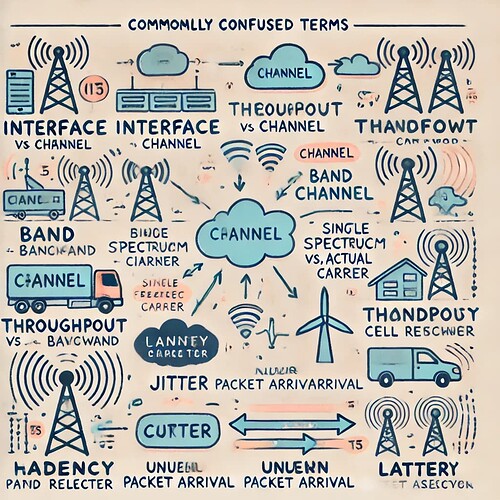In telecom, many technical terms seem similar but have different meanings. Here are 15 commonly confused terms:
![]() Interface vs. Channel – An interface connects network elements, while a channel carries data within that connection.
Interface vs. Channel – An interface connects network elements, while a channel carries data within that connection.
![]() Band vs. Carrier – Band is a frequency range, whereas a carrier is a specific signal within that band.
Band vs. Carrier – Band is a frequency range, whereas a carrier is a specific signal within that band.
![]() Throughput vs. Bandwidth – Bandwidth is the theoretical capacity, while throughput is the actual data speed experienced.
Throughput vs. Bandwidth – Bandwidth is the theoretical capacity, while throughput is the actual data speed experienced.
![]() Handover vs. Cell Reselection – Handover happens during an active connection, whereas cell reselection occurs in idle mode.
Handover vs. Cell Reselection – Handover happens during an active connection, whereas cell reselection occurs in idle mode.
![]() Latency vs. Jitter – Latency is the total delay in data transmission, while jitter is the variation in packet delivery time.
Latency vs. Jitter – Latency is the total delay in data transmission, while jitter is the variation in packet delivery time.
![]() SINR vs. RSRQ vs. RSRP – RSRP measures signal strength, RSRQ indicates signal quality, and SINR shows interference levels.
SINR vs. RSRQ vs. RSRP – RSRP measures signal strength, RSRQ indicates signal quality, and SINR shows interference levels.
![]() Beamforming vs. MIMO – Beamforming directs signals to specific users, while MIMO enhances throughput using multiple streams.
Beamforming vs. MIMO – Beamforming directs signals to specific users, while MIMO enhances throughput using multiple streams.
![]() TDD vs. FDD – TDD alternates uplink and downlink in time slots, while FDD operates both simultaneously on separate frequencies.
TDD vs. FDD – TDD alternates uplink and downlink in time slots, while FDD operates both simultaneously on separate frequencies.
![]() Modulation vs. Coding – Modulation converts digital data to analog signals, while coding adds redundancy for error correction.
Modulation vs. Coding – Modulation converts digital data to analog signals, while coding adds redundancy for error correction.
![]() Control Plane vs. User Plane – Control Plane manages signaling, while User Plane carries actual user data.
Control Plane vs. User Plane – Control Plane manages signaling, while User Plane carries actual user data.
![]() DL vs. UL Scheduling – DL scheduling assigns resources for downlink, while UL scheduling does the same for uplink.
DL vs. UL Scheduling – DL scheduling assigns resources for downlink, while UL scheduling does the same for uplink.
![]() Macrocell vs. Small Cell – Macrocells cover large areas with high power, while small cells are low-power solutions for dense areas.
Macrocell vs. Small Cell – Macrocells cover large areas with high power, while small cells are low-power solutions for dense areas.
![]() Half Duplex vs. Full Duplex – Half duplex allows one-way communication at a time, while full duplex supports simultaneous two-way communication.
Half Duplex vs. Full Duplex – Half duplex allows one-way communication at a time, while full duplex supports simultaneous two-way communication.
![]() Licensed vs. Unlicensed Spectrum – Licensed spectrum is assigned to specific operators, while unlicensed spectrum is open for public use.
Licensed vs. Unlicensed Spectrum – Licensed spectrum is assigned to specific operators, while unlicensed spectrum is open for public use.
![]() HARQ vs. ARQ – HARQ (Hybrid ARQ) combines error correction and retransmission, while ARQ (Automatic Repeat reQuest) only retransmits lost packets.
HARQ vs. ARQ – HARQ (Hybrid ARQ) combines error correction and retransmission, while ARQ (Automatic Repeat reQuest) only retransmits lost packets.
LinkedIn: ![]()
![]() You may also like this: Telecom Terms That Often Cause Confusion - Part 2
You may also like this: Telecom Terms That Often Cause Confusion - Part 2
